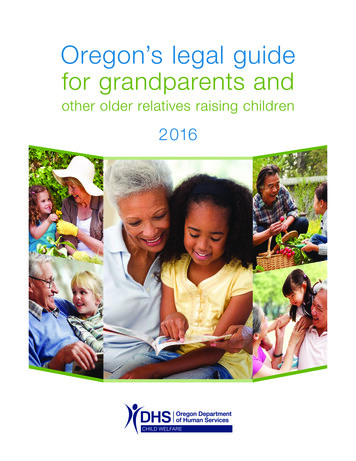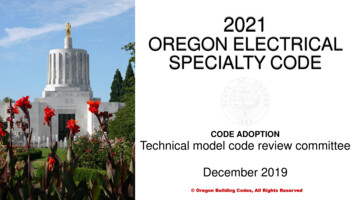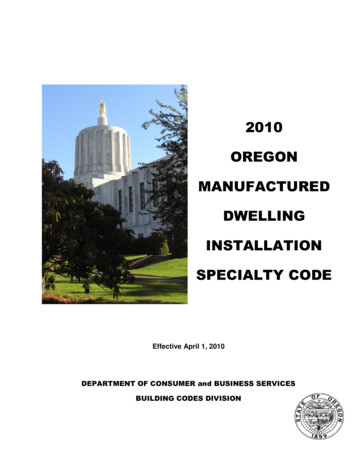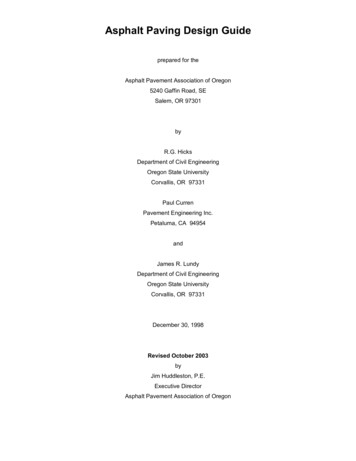
Transcription
Oregon’s legal guidefor grandparents andother older relatives raising children2016
Many families in Oregon find themselves with the unexpected opportunity ofcaring for their relatives’ children. The willingness to step up and providecare and support can be a gift to both the child and the relative. However, therelative needs to understand his or her legal options and obligations when raisinga young child. This guide discusses legal topics grandparents and other relativesneed to know when caring for a young child. Info applies to all minors in theelder’s home.This book is based in part on copyrighted material produced by Mara Fieldsand Legal Aid Services of Oregon, and used with their permission. Alsoacknowledged is Peter James of the Oregon Law Center for backgroundinformation on public benefits. Thanks to Janay Haas, J.D., who edited andorganized the information.This guide was originally published in 2004 through a grant by the BrookdaleFoundation. It was updated again in 2009 and 2012. Past partners in thedevelopment of this guide include Oregon State University’s Extension Family andCommunity Health Program, AARP, and Oregon Department of Human Services.Staff in local Area on Agencies implement the Relatives as Parents Programthroughout Oregon. The program is funded through the Older Americans ActFamily Caregiver Support Program.Revised January 2016IIOregon’s legal guide for grandparents and other relatives raising children
ContentsAbout reading this guide. 1Introduction. 2The Governor’s Advocacy Office,DHS Ombudsman and Children’s Ombudsman. 3Part 1. The rights of parents: A framework for discussion.4Part 2. Occasional contact with the children. 52a. Authorization for health care. 52b. Who can take the kids from my care?. 62c. What if the kids aren’t safe with their parent?. 7Part 3. The grandchildren are staying with me for now. 93a. Temporary power of attorney for childcare. 93b. Temporary power of attorney for children of military families.113c. Temporary power of attorney form.123d. Having the children without written authority.14Part 4. No contact with the grandchildren.164a. What’s keeping you apart?.164b. Court-ordered visitation.184c. Considerations for court. 21Part 5. Taking over primary care of children. 225a. Temporary power of attorney for childcare. 225b. Guardianship—with the parents’ cooperation. 225c. Guardianship without the parents’ cooperation.245d. Legal custody. 265e. Juvenile dependency cases. 275f. Adoption. 30Part 6. Violence in the family. 33Oregon’s legal guide for grandparents and other relatives raising childrenIII
ContentsPart 7. Tribal involvement in court cases that affect children. 35“When does ICWA apply to a case involving a child?”. 35Part 8. Day-to-day issues for caretaker relatives. 378a. School registration. 378b. Problems at school. 388c. Medical costs and insurance. 398d. Affordable Care Act and tax credits.418e. Financial help.418f. Getting a break from childcare.478g. Living in “seniors only” rental housing.478h. Housing discrimination against families. 498i. Other housing situations. 508j. Traveling and moving.51Part 9. Planning for the future. 53Part 10. Resources and services. 5510a. Legal resources. 5510b. Legal service programs, by county. 5610c. Oregon County Circuit Courts. 5910d. Tribal Courts. 6010e. Area Agencies on Aging offices by county. 6110f. Oregon Department of Human Services,Self-Sufficiency offices, by county. 6510g. Oregon Department of Human Services,Child Welfare offices, by county. 6710h. Organizations and services. 69Part 11. Glossary. 70IVOregon’s legal guide for grandparents and other relatives raising children
Note: The material in this guide was up-to-date as of January 2016 and appliesonly to relatives of children living in Oregon.The law can change at any time as a result of the actions of courts and theLegislature. This guide contains general information only. It does not take theplace of legal advice for the facts in your situation.About reading this guideThis guide looks at problems met by grandparents and other relatives and thelaws that apply. It includes simple issues faced by relatives who are regularly incontact with their grandchildren, the problem of getting access to grandchildrenwhen a parent does not encourage or support contact, and situations wheregrandparents must temporarily or permanently take over the job of parentingtheir grandchildren.Because grandparents are also parents and the parents of grandchildren arechildren too, talking about the relationships among the three generations canget confusing. This is what is meant when using those terms: The law that applies to grandparents also applies to other non-parentrelatives. “Grandparent” will always include aunts, uncles, cousins, siblings,great-uncles, etc., (even stepparents who have not adopted their spouse’sor domestic partner’s children) unless the guide says otherwise.»» “Parent” or “parents” will always mean the parents of the minor childrenthe grandparent or other relative is concerned about.»» “Child,” “children,” “grandchild” or “grandchildren” will always identifythe minor children the grandparent is concerned about.Important terms in this guide will appear in boldface type. Those words aredefined in the glossary at the end of this guide.Oregon’s legal guide for grandparents and other relatives raising children1
IntroductionThe role of grandparents in the United States has undergone dramatic changes inthe last century. In the early 1900s, grandparents, aunts and uncles often sharedthe family home. The “nuclear family” was born less than 50 years later as parentsand children moved hundreds, sometimes thousands of miles away from theirextended families for new jobs and opportunities. Grandparents and other relativesbecame faces in photographs and voices on the phone to their grandchildren.Other social changes — divorce, single parenting, an epidemic in drug andalcohol problems — affected whether and how extended families continued toconnect. In extreme cases, grandparents never saw their grandchildren again,no matter how much they wanted to see them.In a growing trend, many grandparents and other relatives find themselves inthe role of parents all over again as the primary caretakers of the children oftheir own adult children. Shifts in the economy mean more extended familiesliving together as parents and children move in with grandparents after theloss of a job or their home.The number of American children living with relatives other than their parentsrose from four million to more than six million over the past two decades. By2009, almost three million grandparents were parenting their grandchildren.Sixty-two percent of those grandparents were female, many of them single andparenting alone. Those numbers have held steady. More than 51,000 childrenin Oregon are living with grandparents or other relatives.Relatives who care for these children may find these unexpected new relationshipsvery rewarding. They also can place tremendous strain on those who have healthproblems or limited finances. All of these changes are reflected in the law.This guide aims to help non-parent families, especially elders, know aboutsome of the legal problems they might run into, some possible solutions tothose problems, and describe various legal options to consider as they forgerelationships with their grandchildren.A companion guide, A Resource Guide for Grandparents and Other RelativesRaising Children in Oregon (2015), describes many other kinds of resourcesavailable for grandparents once again taking on the challenges of parenting.2Oregon’s legal guide for grandparents and other relatives raising children
IntroductionThe Governor’s Advocacy Office,DHS Ombudsman and Children’s OmbudsmanThe Governor’s Advocacy Office serves thousands of families throughout Oregonevery year. Residents who need information about services or programs providedby the Department of Human Services (DHS) can get help and direction fromombudsmen in the Governor’s Advocacy Office.The Governor’s Advocacy Office can answer questions about: Child and elder abuse and neglect Health and dental programs Homelessness Personal or family crisis Drug and alcohol treatment Mental health programs Services for people with developmental disabilities Management of chronic pain Other issuesPhone: 503-945-6904Toll-free: o.aspxOregon’s legal guide for grandparents and other relatives raising children3
Part 1. The rights of parents: A frameworkfor discussionIt was not so long ago when the law viewed women and children as the propertyof men. Although women no longer are defined that way under the law, courtshave hesitated about the rights of children. Courts still say the Constitution protectsthe “liberty” interest of parents to rear their children the way they see fit. The lawpresumes parents act in the best interest of their children. When the state believes aparent is not acting in the children’s best interest, it will first look to the other parent totake over the care of the children. The state cannot permanently remove a child fromthe parents’ home without their permission unless it can show the parents are unfit.Both parents of a child have equal say in the child’s life, unless there is a courtorder limiting the rights of the parents (through legal custody and parenting time,for example). The rights of parents include decision-making about everyday mattersand important social matters, such as medical treatment, education and religion.What makes a person a legal parent? Generally, a child’s natural mother is thechild’s legal mother (unless the birth mother is acting as a surrogate) until thechild is legally adopted by another person or the natural mother’s parental rightsare terminated by the state. Whether a man is a child’s legal father is sometimesmore difficult to determine. The husband of a woman who gives birth to a childduring their marriage is presumed to be the legal father of the child (unless heor the wife later proves otherwise). He is still considered the legal father if thechild was conceived by artificial insemination. A man who signs an official stateform acknowledging he is the father is presumed to be the father of the child. Aman who legally adopts the child of another becomes the child’s legal father. In apaternity case, the court can determine whether a man (married to the mother ornot) is the legal father of a child.The state can terminate a father’s parental rights, making him no longer the legalfather of a child or the father can give up his parental rights by agreeing to allowsomeone else to adopt his child.A stepparent who has not adopted his or her spouse’s children does nothave parental rights. Under Oregon law, he or she has rights similar to thosegrandparents have.4Oregon’s legal guide for grandparents and other relatives raising children
Part 2. Occasional contact withthe children2a. Authorization for health care“ I’m just an occasional babysitter for my grandkids after schoolor on Saturday nights. Is there anything I need to know?”A relative who is babysitting has no more authority over a child than a strangerwould have. Unless one of the parents gives you permission, you usually can’tauthorize medical or dental care for a child. (In emergencies, hospital staff areallowed to provide life-saving treatment and other major medical procedures, butthey can do nothing beyond that without parental permission.)The simple solution is to get written permission from one of the parents. It canbe handwritten and include only the date, the name and birth date of the child,the name of the person authorized to get care for the child, and a statement thatthe parent permits the person to authorize necessary medical and dental care.See the example below.To whom it may concern:I hereby give to [grandparent’s name] the authority toget necessary medical or dental treatment for my minorchild, [name], [date of birth].Our health insurance policy is with [insurance company],[group #, policy #]. (If child has special medical needs, list them here.)My child’s regular doctor is [doctor’s name], [doctor’s address].Sincerely,[Signature and date]Oregon’s legal guide for grandparents and other relatives raising children5
2a. Authorization for health careIt is helpful for the parent to provide information about the child’s regularphysician or health insurance, but not essential. The doctor or hospital willneed that information if the child is covered by the Oregon Health Plan(OHP) or other Medicaid or Medicare coverage.Doctors can insist on getting paid at the time they see the child in a nonemergency situation. If the parents have no insurance or Medicaid coveragefor the child, ask them to leave money with you for or have some emergencycash on hand. If you have Medicare, Medicaid or OHP coverage, rememberyour personal coverage will not be accepted for the child. See Section 8c formore information about health care coverage for grandchildren in your care.The short answer. You should always get written permission from a parent to dealwith the children’s medical or dental problems.2b. Who can take the kids from my care?“ I babysit my grandchildren while my daughter works. She andthe father of the children are not married. If he wants thechildren when they are with me, what are my rights?”The scope of your rights, unless you have your own court order giving you specificrights, depends on the scope of your daughter’s rights. Both legal parents, marriedor not, have equal rights over their children unless and until a court gives onegreater rights than the other.Either parent can take the children from a non-parent on demand if there is nocourt order giving one parent specific times with the children. You do not have toturn them over to their father if a current court order says your daughter has theright to the children during the time you are babysitting.You can even tell the other parent to leave your home if he or she has no legalright to be there.6Oregon’s legal guide for grandparents and other relatives raising children
2b. Who can take the kids from my care?It can be very helpful to have a copy of the court order on hand when thechildren are with you if the order says who is to have the children and when. Youmay be asked to show the order to a police officer if the other parent tries to gethelp from the police.Parents may have more than one court order and those orders may conflict witheach other. There may be no court order and it may even be unclear whether thefather is legally the father of the children. It is extremely important to get specificlegal advice before taking any action to hand over or withhold the children.Some grandparents are able to get parents to agree to a court order allowing therelatives to have the children for periods of time. (See Part 4.) Or you may evenhave a court order for visits without their cooperation. (See Part 4b.) If you havethe children when they are authorized by a court order to be with you, you do nothave to turn them over to anyone else during that time unless a judge says so.You should be sure to have a copy on hand to show to police or other officials ifthey question your rights.The short answer. Unless a court order says otherwise, one of the child’s parents hasthe same right to the child the other parent has, and you must relinquish the child toeither one when asked.2c. What if the kids aren’t safe with their parent?“ I took care of my son’s two kids yesterday afternoon. Whenhe came to get them, it was obvious he had been drinking. Iwas afraid to let the kids get into a car with him, but I didn’tknow what else to do.”Oregon’s Department of Human Services Child Welfare has a duty to intervenein cases of child abuse and neglect. Unfortunately, it is virtually impossible toget an agency investigator onto the scene in the time it takes to put children ina car. The parent has the right to take the grandchildren with him unless there isa court order that keeps the parent from taking children under circumstances likethese. He doesn’t have the right to expose them to danger, which he would do bydriving with the children when he is under the influence of intoxicants.Oregon’s legal guide for grandparents and other relatives raising children7
2c. What if the kids aren’t safe with their parent?The grandparent or anyone else in this situation can try to persuade the parentto use a taxi, can offer to drive everyone, or try to convince the parent to waituntil he or she is sober. You can try to contact the other parent if you have time.The best you may be able to do is make sure the children are buckled safely inthe back seat, get the license number of the car, and call the police right awayto report a drunk driver.Calling the police may seem harsh or disloyal, but not doing so can mean thechildren are injured or killed. Sometimes police involvement is necessary beforea parent with an alcohol or drug problem is willing to change behavior. Police canprovide important independent evidence that the children need outside help ifyou are seriously concerned about the parent’s general ability to care properlyfor the children. (See Parts 5e and 6.)The short answer. A grandparent cannot lawfully keep the children away from theparent if there is no court order to stop an impaired parent from exposing children topotential danger.8Oregon’s legal guide for grandparents and other relatives raising children
Part 3. The grandchildren are stayingwith me for now3a. Temporary power of attorney for childcare“ My son and his wife are planning to spend the summer andpart of the fall in Europe. They want the children to staywith me. How can I get authority to care for the children’smedical and school needs while the parents are gone?”“ My daughter, who is in the Army, is about to be deployed. Shewill be gone for perhaps a year, maybe even longer. What do Ineed to do to take care of my grandchild while she’s overseas?”Oregon has laws that allow people to authorize other people to handle variouskinds of affairs on their behalf. The usual way to authorize someone else tohandle things for you is through a power of attorney. A power of attorneydoesn’t give away your rights to handle your own affairs; it gives those rightsto someone in addition to you, so long as you agree to that person’s sharingthe power with you.Oregon law provides a special temporary power of attorney parents can useto give others the right to take care of their children for up to six months at atime. A sample of a form for this purpose is printed in Part 3c. This form willwork for most purposes. Parents who will be on long-time active duty whenchildren can’t accompany them, see Part 3b, below.The parent can give you authority to make decisions about medical care andenroll the child in school using this kind of power of attorney. You can exerciseall of the parental rights the parent has unless the parent puts limits in thepower of attorney about what you can do. An exception to this is the right toagree to the marriage or the adoption of the child.No court involvement is necessary to obtain this power of attorney or to end it.The parent can stop sharing the power without needing a reason, even beforethe six-month limit of the power of attorney is reached. The parent has the rightto get the children back at any time.Oregon’s legal guide for grandparents and other relatives raising children9
3a. Temporary power of attorney for childcareThe parent who is giving power over more than one child to one relative can listall the children on one form. The grandparent who receives a temporary power ofattorney for children should keep the original signed form until the power expiresor is cancelled (or “revoked”).The parent who wants to end (revoke) this kind of power of attorney before thedate of the document should give a written statement to that effect to the personwho has the power of attorney. The statement should give the date the poweris revoked. (The date of revocation can be no earlier than the date the parentnotifies the grandparent that the power is revoked.) No reason is required.This type of power of attorney expires automatically after six months if the parentdoes not specify an earlier date for it to end. A parent can make a new power ofattorney for childcare every six months, if desired.There are some drawbacks to the use of the temporary power of attorneyfor childcare: A parent cannot share authority greater than the authority he or shehas. A father who is not the children’s “legal” father has no authorityto give. A parent who has court-ordered status as the custodial parentcan share any of the rights the court has granted to him or her. Anoncustodial parent under such a court order generally has fewerrights, which can differ from person to person. Court orders involving custody and parenting time often place some limitson where the children can travel or live. (See Part 8i.) Inquire about anycourt orders that describe that parent’s rights and have a lawyer look overthe documents if you are concerned about what rights a parent has lawfullygiven you. The grandparent who receives the power of attorney for childcare, evenif the power is renewed for several six month periods, has no legallyenforceable right to child support from either of the parents. It maybe possible to get financial and medical benefits for the child. (See Parts8c and d.)10Oregon’s legal guide for grandparents and other relatives raising children
3b. Temporary power of attorney for children ofmilitary familiesParents who are going on active military duty can sign a temporary power ofattorney for childcare. Six months may not be long enough for some parents.Reservists and National Guard members may be deployed for 15 to 18 months.These parents can give a special power of attorney that will last for the time theyare actively deployed, plus 30 more days. Some of the language in the standardform in Part 3c, below, will need to be changed for these parents. The militaryparent cannot give the power to anyone other than the child’s other parent ifthe child is already living with the other parent except in unusual circumstances.It is still true whoever gives the power can give no more power than he or shepossesses over the child.The short answer. Generally, a temporary power of attorney gives the grandparentthe necessary authority to act on a child’s behalf in the parents’ absence for up to sixmonths, or longer if the parents are on active military duty.Oregon’s legal guide for grandparents and other relatives raising children11
3c. Temporary power of attorney formPOWER OF ATTORNEY RE: MINOR CHILDRENI,of, Oregon, mother/father ofthe child/ren named below, by this document do temporarily appointof, Oregon to be my true andlawful attorney, for me and in my name and place, and for my benefit:To have the care, custody, and control of my child/ren:, born, born, bornand to do all things necessary to properly care for the/se child/ren.To consent to and authorize any and all medical treatment necessary for the proper care of mychild/ren; andTo consent to and authorize any and all actions necessary for the proper care of my child/renregarding her/his/their attendance at any public or private institution or school.I hereby grant my said attorney full power and authority to do every act necessary to be done,and fully to all intents and purposes, as I might or could do if personally present, and I herebyratify and confirm that which my said attorney shall lawfully do or cause to be done by virtue ofthis document.(Initial one:)T his power of attorney is valid for six months from the date on which I have signed it,unless I revoke it sooner. This power of attorney is valid until, 201shorter than six months from date of signing.). (Time period must beIn witness thereof, I have signed this power of attorney on this day ofSignature:.Print name:STATE OF OREGON)County of)) ss.SUBSCRIBED AND SWORN to bybefore me,, a NotaryPublic for the State of Oregon thisday of, 201Notary Public for Oregon. My commission expires:12, 201Oregon’s legal guide for grandparents and other relatives raising children.
3c. Temporary power of attorney formHow to fill out this form1. In the first two blanks of this model form, type or neatly print the nameof the parent who will sign over the power, followed by the city where theparent lives.2. In the next two blanks, put the name of the person who will get the powerand the city where that person lives.3. Fill in the names and dates of birth of all of the children involved.4. Next, have the parent take the form, with photo identification, to a notarypublic to sign the form and have it notarized. Notary publics can be foundin most banks, real estate offices and law offices. Some charge for theirservice. Note: If the parent is in another state, that state may have a specificform the parent should use instead. If no specific form is required there, thesample form here should be changed to show the state where it is signedand notarized.5. The parent gives the completed form to the person who will act as thecaregiver — that is, the “attorney.”6. For the parent who is going on active duty, slightly different language will beneeded in a temporary power of attorney for childcare.7. At the beginning of the form, where the parent states his or her name, theparent also should identify himself or herself as a member of a specificbranch of the U.S. military.8. In the section of the form that says how long the power is to last, themilitary parent should say that “The power designated above is delegatedfor the period until [the date the deployment ends, if known]/[a period notexceeding the term of active duty service, if the ending date is not known],plus 30 days.”Oregon’s legal guide for grandparents and other relatives raising children13
3d. Having the children without written authority“ My daughter dropped off my grandchildren at my house threemonths ago, and I haven’t heard from her since. How can Iget them in to see a doctor or get them into my local schoolwithout her OK?”Under Oregon law, a grandparent who becomes responsible for the care of agrandchild when parents are away may be able to get medical and dental carefor the child and enroll the child in school without the parents’ approval in somesituations. The grandchild must already be living with the grandparent. Thegrandparent also must try in good faith to contact at least one of the parents toask for consent for medical care or for admission to school, or be able to explainwhy he or she couldn’t contact the parent. The grandparent must then fill out anaffidavit and sign it in front of a notary public. A sample form, called affidavit ofrelative caregiver, is shown on the next page.How to complete the form:1. In the first three blanks, type or neatly print your full name, your Oregondriver license or state identification number, and the date of your birth.2. List your relationship (grandmother, etc.) to the children, then list the fullnames of the children and their dates of birth. These children must be livingwith you. State the address where you all live.3. List the full name of at least one of
relative needs to understand his or her legal options and obligations when raising a young child. This guide discusses legal topics grandparents and other relatives need to know when caring for a young child. Info applies to all minors in the elder's home. This book is based in part on copyrighted material produced by Mara Fields










